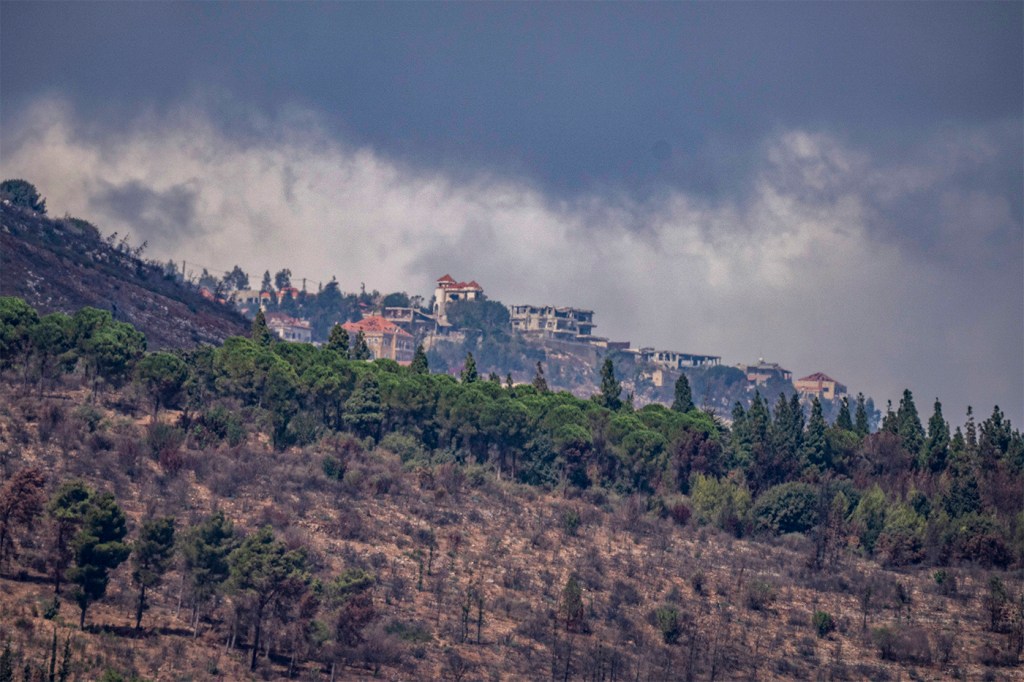Israel invades southern Lebanon, Iran bombards Israel with missiles. Has a wider war begun?
Northeastern Professor Pablo Calderon Martinez says: “If [Iran] reaches targets in Israel and causes serious harm, then yes,” we could have a full-blown war.

This report is part of ongoing coverage of the Israel-Hamas war. Visit our dedicated page for more on this topic.
Residents in southern Lebanon woke up Tuesday morning to find Israeli troops again at their doorsteps amid another major escalation of hostilities in the form of a targeted ground invasion.
Meanwhile, Iran, which backs Hezbollah, also escalated the long-simmering conflict by bombarding Israel with missiles.
The “limited, localized and targeted” ground operation — as the Israeli Defense Forces (IDF) describes it — in southern Lebanon, together with Iran’s strikes, is a major development in the Middle East that carries the risk of a broader conflagration, says Pablo Calderon Martinez, a Northeastern University associate professor in politics and international relations based in London.

If Iran’s barrages — seen over Tel Aviv Tuesday evening — result in civilian casualties, a regional war is likely to follow.
“If [Iran] reaches targets in Israel and causes serious harm, then yes,” Martinez says. “It’s hard to see a way back from that.”
Tuesday’s developments come as Israel continues to wage its war against Hamas in Gaza in response to the Oct. 7 attack that killed nearly 1,200 people. The IDF says its goal in Lebanon is to incapacitate the Iranian-backed militia Hezbollah, which has been firing rockets deep into Israel since the Hamas attack.
Martinez says the escalation seemed “almost like an inevitability” — one that raises grave concerns not only about the realities of a full-blown regional war, but about the stability of the region for potentially years to come.
“These [operations] have a tendency to take on a life of their own,” Martinez says about Israel’s ground operation. “They’re never quick, they’re never easy, and — I’ve said this before — but I don’t know what victory for Israel looks like here.”
It’s shades of the U.S. wars in Iraq and Afghanistan in the early aughts, Martinez says.
“The Taliban was able to wait out the U.S. operation some 20 years after the fact,” he says.
Featured Posts
A protracted conflict on two fronts
Israel’s “ground raids” are based on “precise intelligence against Hezbollah terrorist targets and infrastructure in Southern Lebanon,” the IDF says.
“The IDF is operating according to a methodical plan set out by the General Staff and Northern Command which IDF soldiers have trained and prepared for in recent months,” the IDF said in a statement.
With Israel’s war in Gaza dragging on, approaching its one-year anniversary this month, Martinez says Israel risks a protracted conflict on two fronts.
“More than resources, what you spent with a war like this is political capital,” Martinez says. “Israel can engage in a perpetual war pretty much forever — and the U.S. as well.”
But he suspects this latest escalation will cause even more friction between the U.S. and Israel as the Biden administration struggles to square its diplomatic stance with Israel’s actions.
Asked about whether he was aware of Israel’s plans on Monday, President Joe Biden said: “I’m more aware than you might know, and I’m comfortable with them stopping. We should have a cease-fire now.”
Potentially millions flee violence
Israel’s raids have also resulted in what Lebanon’s prime minister describes as potentially “the largest displacement movement” in the country’s history, with upwards of one million residents fleeing the violence.
The Lebanon incursion comes just days after Israel announced that it had killed Hassan Nasrallah, Hezbollah’s longtime leader who served as its secretary general, in a large-scale attack in southern Beirut. The Lebanese militant group confirmed his death.
It also comes after a series of pager and walkie-talkie explosions orchestrated by Israel resulted in at least 25 deaths and more than 600 injuries in Lebanon.
“This puts pressure across NATO and across the Western alliance,” Martinez says. “I think the U.S. will give Israel some freedom and leeway here, but I don’t think it’s in the best strategic interest of the United States for this to become another endless war and expedition that could spill into Syria, Yemen, Iraq, etc.”
He continues: “On the other hand, it seems to me that the Israeli government is acting more unilaterally — and without necessarily paying due attention to the preferences of the U.S. government, and that could be a reflection of the changing government in the U.S. Domestic politics can play a big part.”
Beginning of a regional war?
“The shape this conflict is going to take is going to be one of civil conflict,” Martinez says. “This is what happened in the Lebanese Civil War. The reality is there are segments of the society in Lebanon that hate Hezbollah as much if not more than they dislike Israel.”
Whereas in the 20th century, when wars took place according to more or less clearly defined “alliances, borders and armies,” a regional conflict in the Middle East today would be largely shaped by militant factions, non-state actors and their proxy sponsors, Martinez says.
Iran backs Hezbollah and Hamas, the two militia groups currently fighting Israel, as well as the Houthis in Yemen, who have also been attacking Israel with rockets in recent weeks and months.
According to the New York Times, U.S. officials said Iran is likely to launch “mostly, if not solely,” ballistic missiles at Israel.












